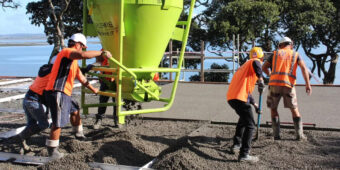RIGHT FIRST TIME
26 Aug 2020, LBP & Regulation, Learn, Prove Your Know How

Getting work done correctly the first time is an efficient way of meeting deadlines, budgets and standards. It is also one of the reasons the licensing regime was introduced
By having LBPs, consumers can have the confidence that their homes will be built right the first time, because LBPs should have the necessary skills and capability to build correctly and resolve any issues as they arise.
Defence 1 – ‘Unfinished’ work
The Building Practitioners Board (the Board) deals with a lot of complaints where LBPs did not get it right first time. Instead, they have been ignorant of the issues, or have chosen to ignore them, and have moved on with the building process. Often the LBP’s defence is that the work was not finished, and that the LBP was going to return and remediate the non-compliant or substandard building work.
Sometimes this is acceptable, such as where a snag list is generated relating to minor items. Mistakes are made and not all mistakes should lead to an LBP being disciplined. However, when there are major quality issues or non-compliance, which should not have occurred, then a disciplinary outcome may be appropriate.
When an LBP claims “it’s not finished” as a defence, the Board will look at the sequencing of the work to assess if there is any merit to what they are saying. If deconstruction is required to remediate the problem, or the costs involved in bringing the build up to standard are greater than they would have been by doing it right the first time, then the defence is difficult to accept.
The Board also looks at whether the LBP had a process to identify and deal with such issues during the build. If there is a quality assurance system in place, the “it’s not finished” defence can hold weight. However, if the LBP was unaware of the issues, or they have had to be brought to their attention by others, then it is unlikely the Board will accept it.
This is especially the case when it is a building consent authority (BCA) that is noting non-compliance at inspections. In one complaint (Zahid Ali – C2-01592) there were repeated inspection failures, often for the same issues, over multiple sites. The Board noted that the BCA’s role is to check that the building work has been carried out in accordance with the building consent. It is not to instruct or give direction on how compliance can be achieved. The Board expects an LBP to have the necessary knowledge and skills to carry out routine building work in a compliant manner, without requiring such assistance.
Defence 2 – Compliance provided
A similar defence the Board often hears is “but the council gave it a pass”. There are various things the Board considers in this situation. Was it a case of eventually getting it right after multiple failures, as in the Ali case? Did the BCA miss a non-compliance issue and pass building work that was not compliant? If this is the case, should the non-compliance have been apparent to the LBP? If the Board considers the LBP should have identified or been aware of the non-compliance, then the LBP might be open to being disciplined.
Getting a pass from a BCA does not absolve an LBP from accountability for non-compliant work. LBPs should also note that BCAs are only looking at compliance; they do not check the quality of the work. Compliant work can still be substandard, especially where there is evidence of poor workmanship. Therefore, an LBP can still be disciplined for building work that is substandard, even if it meets the minimum requirements for compliance.
Licensing was brought in to improve standards and accountability. LBPs should have the skills and knowledge to get the job done correctly – so, if they botch a job, they should be held to account for their negligence or incompetence.
Getting it right the first time, and having a quality assurance system to catch minor mistakes, is the best way to avoid the complaints process. It is also better business practice, as it helps to keep builds within budget, on schedule and up to standard, which in turn leads to satisfied customers and a more prosperous economy for all.
This article is an excerpt from Codewords Issue 96. Reading Codewords articles that are relevant to your licence class is a mandatory requirement for Licensed Building Practitioners. These questions can be answered through the LBP portal, online at underconstruction.placemakers.co.nz or recorded on the magazine, then provided at the time of renewal.
Register to earn LBP Points Sign in
4 Comments
Leave a Reply
You must be logged in to post a comment.




now my page has refreshed all of the above is at the bottom so yes it would applied ? all of the above was shown in the 3rd row witch would suggest option 4 was non avoided. [Sorry Matt, we neglected to untick the ‘sort in random order’ box when setting up the quiz. Thanks for pointing that issue out – it’s fixed now!]
Sorry Matt, we neglected to untick the ‘sort in random order’ box when setting up the quiz. Thanks for pointing that issue out – it’s fixed now!
Work smart
eye for details helps